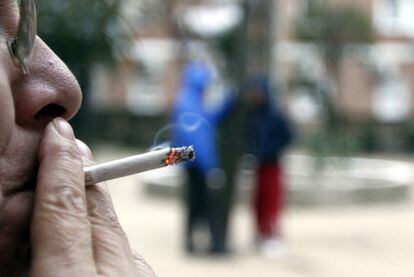PP puts platform pledge to alter public smoking laws on back burner
Restaurant and bar owners are "disappointed" with conservative government
The Health Ministry will not make changes to anti-smoking legislation, a spokesman said on Wednesday. Although reforms to the law had not been on the Popular Party (PP) election platform, then-candidate Mariano Rajoy suggested during his campaigning that, if he won, he might reintroduce separate areas for smokers and non-smokers in bars and restaurants - an initial arrangement that was struck down by a January 2011 reform that completely banned smoking in closed areas.
Rajoy, who went on to win the November 20 elections in a landslide victory, had earlier told the private television network Antena 3: "I think that, as with everything in life, extreme solutions are not good. I know that most people oppose this law that prohibits smoking everywhere. I think we can arbitrate a formula on one basis: that non-smokers cannot be harmed. I totally and completely agree with that."
Later, Health Minister Ana Pastor, a physician, said that the PP supported preserving health but "without screwing up people's lives," explaining that the complete ban is bothersome for many people.
A few minority elements of the food and beverage service sector - especially those who refused to implement the full ban during the first weeks of its enactment and were later fined for it - welcomed Rajoy's words as a sign that smoking would once again be allowed inside bars and restaurants. But they were wrong. The new government's decision is in fact coherent with the PP's congressional support for the law when the conservative party was in the opposition a year ago.
The National Committee for the Prevention of Smoking (CNPT) estimated that around 600,000 people have kicked the habit ever since the strict law went into effect. Before that, smoking killed over 51,000 people annually, including 1,400 passive smokers, according to a 2009 report by the Health Ministry.
Cigarette sales also fell 17 percent in the first 11 months of the year compared with the same period in 2010, according to the Tobacco Market Commission, an industry agency. And that drop comes on the back of previous drops of 11 percent in 2010 and 10 percent in 2009. The motive is not just to be found in anti-smoking legislation, however. The rising price of a pack of cigarettes, together with the economic crisis, has led many smokers to roll their own or to smoke pipes instead.
The CNPT, an agency made up of scientists and physicians, feels that the anti-smoking law has been "a success," according to spokesman Rodrigo Córdoba, who said that the health benefits are "more than evident" while the economic impact on the food and beverage service sector "was overcome between January and February when customers accepted the new situation and returned to their habit of going to bars, restaurants and nightclubs."
But some restaurant and bar owners do lament the "negative impact" of the law, said Josep María Torres, spokesman for the industry association in Catalonia. Torres noted that establishments that have outdoor terraces where smoking is permitted have fared better than those without. "The [political] right has disappointed us," he said.
The unions, meanwhile, agreed with the CNPT that the anti-smoking law is a success story and that it has been fully accepted by citizens. Marisa Rufino, head of occupational safety at the UGT union, said that bar and restaurant workers were relieved at not having to breathe in smoke in order to keep their jobs.











































